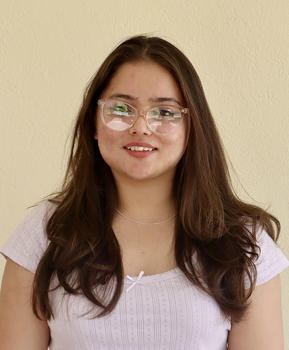Shreeyukti Rana found her calling in health informatics as a way to bridge data science and justice for underserved communities, motivated by a lifelong commitment to public health and inspired by her mother’s advocacy work. Her transformative work with Catholic Charities Diocese of Arlington revealed the power of informatics in addressing social determinants of health and empowering refugee families.
Through George Mason’s interdisciplinary health informatics program, she’s uniting empathy and analytics into sustainable, community-driven health care solutions. Rana shares her inspiration, practicum journey, and experience at George Mason.
What led you to pursue a degree in Health Informatics, and what are your career goals?

Rana: What began as a deep-rooted passion for public health advocacy, inspired by my mother's work in health and women empowerment, quickly evolved into a broader vision through hands-on experiences in the public health research and outreach, where I witnessed firsthand the transformative role of quality data in improving health outcomes and providing better targeted interventions. Pursuing Health Informatics allows me to liaison between these fields, combining my passion for public health with innovative, data-driven solutions. I would love to leverage informatics to advance equitable health care access and develop sustainable solutions for underserved communities.
What inspired you to choose Catholic Charities Diocese of Arlington and the Preferred Communities program for your practicum?
Coming from a developing country, my work has always been driven by the need to reach those without access to essential knowledge or resources. Through George Mason’s Office of Community Engagement and Civic Learning, I learned about Catholic Charities, and its mission deeply resonated with my core values of community service and empowerment. Having worked closely with marginalized groups in the past, I saw an opportunity to use my skills not just to assist, but to uplift newly arrived families as they navigate barriers to self-sufficiency and integration. The opportunity to contribute meaningfully to such impactful work felt like a perfect fit for my skills.
How did this experience shape your perspective on public health and health informatics?
My role at Catholic Charities reinforced my understanding of how deeply social determinants such as housing, employment, and health care access can impact overall quality of life for a family. Working with newly arrived refugees showed me the vital role public health systems play in not just addressing medical needs, but also the structural barriers that affect well-being. This experience highlighted the importance of comprehensive support systems and allowed me to envision a system where case management, resource navigation, and policy-driven support could be enhanced through informatics by leveraging data to identify gaps, track progress, and optimize services.
How does community engagement influence your relationship with health informatics?
Community engagement is at the heart of my approach to health informatics. It fosters empathy, problem-solving, and identification at the grassroots level, engagement in making informed policies that address the disparities and current health scenarios. This experience has taught me the importance of culturally competent solutions and the need for data-driven strategies that are not only effective but inclusive.
How has George Mason’s MS in Health Informatics program helped you find unique opportunities?
The interdisciplinary approach of George Mason’s MS in Health Informatics program has allowed me to connect my background in public health with my now concentration in health data analytics. It has equipped me to navigate both fields simultaneously while strengthening my informatics skills and enhancing my public health knowledge. Through George Mason, I have been able to engage with impactful programs like the Civic Fellows Program, which got me connected to Catholic Charities. These experiences have not only enriched my academic journey but have also shaped my career path by reinforcing the role of informatics in creating sustainable public health solutions.
What advice would you give to students looking to engage in meaningful community work during their program?
My main advice would be to be proactive and intentional with seeking out opportunities that align with your passions and values. Community engagement is not only about building skills, but also nurturing empathy and leadership. Be open to learning from every experience, even when solutions aren't straightforward but most importantly stepping outside of your comfort zone.
